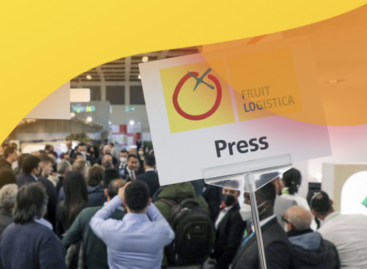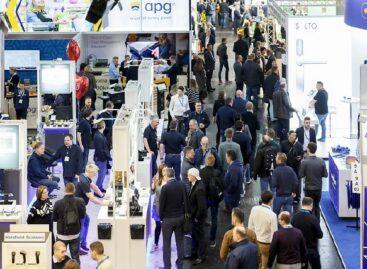EuroCIS in Düsseldorf – part 3
Experts from the Cologne-based EHI Retail Institute asked food retail decision-makers in Germany, Austria, Switzerland and other European countries about the parts in the work process at store checkouts where progress can still be made. Nearly two thirds of decision-makers would like to see more efficient cash-free payments and faster debit/credit card payments, plus they would like to insert mobile payment in the process.
 One fourth mentioned reorganising the checkout zone and the management of queues, and they would also speed up cash payments. Visiting journalists were welcomed by Alexandra Böddeker at the Wincor Nixdorf stand, who showed us a revolutionary self-service checkout system. It looks ordinary but is definitely not: its camera is capable of scanning the barcodes of 60 goods on the conveyor per minute and recognises 98 percent of the items; if a barcode is not scanned, the system takes a picture and gives the assistant a ring automatically. ‘Towerline’ is the name of the modular solution and it can be used in stores of different type and size, plus it works very fast. Toshiba Tec is an independent company within the Toshiba group which tailors its innovation activity to retail’s needs. Head of division Ulrich Hieber showed us a sales-stimulating touchscreen at their stand. Shoppers can use these to select goods and look for accompanying recipes, which they can either print or send to an e-mail address. Motorola introduced its wireless Linear-Imager LI4278 for the first time in Europe. Marketing executive Susanne Stier informed us that by using it barcodes from mobile phones can be scanned, in order to implement coupon promotions, use vouchers or loyalty cards. This way marketing promotions or personalised offers can also be made. KPMG and EHI Retail Institute prepared a study together, among other things trying to find out how e-commerce affects sales of traditional stores. They found that traditional stores remain to be the most important for consumers. At the same time there is robust growth taking place in online retail. Consequently, the integration of the two channels is becoming increasingly likely. From Mark Sievers, head of consumer goods and retail at KPMG we learned that in the case of groceries traditional stores will hold on to their advantage of providing shoppers with the goods at once. According to him, traditional stores will also turn online buying into an advantage: 44 percent of people asked said they would surely order products online and collect them later in-store; a further 30 said maybe they would do it. However, only 21 percent opined that online buying is an attractive concept. (To be continued)
One fourth mentioned reorganising the checkout zone and the management of queues, and they would also speed up cash payments. Visiting journalists were welcomed by Alexandra Böddeker at the Wincor Nixdorf stand, who showed us a revolutionary self-service checkout system. It looks ordinary but is definitely not: its camera is capable of scanning the barcodes of 60 goods on the conveyor per minute and recognises 98 percent of the items; if a barcode is not scanned, the system takes a picture and gives the assistant a ring automatically. ‘Towerline’ is the name of the modular solution and it can be used in stores of different type and size, plus it works very fast. Toshiba Tec is an independent company within the Toshiba group which tailors its innovation activity to retail’s needs. Head of division Ulrich Hieber showed us a sales-stimulating touchscreen at their stand. Shoppers can use these to select goods and look for accompanying recipes, which they can either print or send to an e-mail address. Motorola introduced its wireless Linear-Imager LI4278 for the first time in Europe. Marketing executive Susanne Stier informed us that by using it barcodes from mobile phones can be scanned, in order to implement coupon promotions, use vouchers or loyalty cards. This way marketing promotions or personalised offers can also be made. KPMG and EHI Retail Institute prepared a study together, among other things trying to find out how e-commerce affects sales of traditional stores. They found that traditional stores remain to be the most important for consumers. At the same time there is robust growth taking place in online retail. Consequently, the integration of the two channels is becoming increasingly likely. From Mark Sievers, head of consumer goods and retail at KPMG we learned that in the case of groceries traditional stores will hold on to their advantage of providing shoppers with the goods at once. According to him, traditional stores will also turn online buying into an advantage: 44 percent of people asked said they would surely order products online and collect them later in-store; a further 30 said maybe they would do it. However, only 21 percent opined that online buying is an attractive concept. (To be continued)
Related news
Related news
This year, Trade magazine is asking its readers for their opinions on Christmas TV commercials! Vote for yourself!
The audience voting takes place between December 12 and 19,…
Read more >FRUIT LOGISTICA 2025: The exhibition awaits visitors with numerous innovations
Representatives of the international fruit and vegetable trade will meet…
Read more >EuroCIS 2025: Serious interest in the retail technology trade fair
Amazon and TikTok recently signed an agreement that will allow…
Read more >





